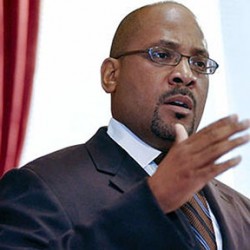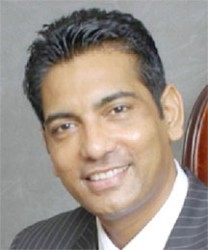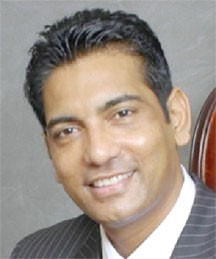After five and a half days of deliberation, a Brooklyn federal jury yesterday found New York State Senator John Sampson, against whom Guyanese mortgage fraudster Ed Ahmad was a key witness, guilty of an obstruction of justice charge and lying to federal agents, a New York Post report said.

The report said that the senator was cleared of six of the nine counts he faced, including the top charge of conspiracy to obstruct justice, which carried a maximum of 20 years in prison.
But he still faces heavy prison time. Prosecutors said federal sentencing guidelines carry roughly 10 years in prison for the obstruction charge he was convicted of, and he must also forfeit his seat in the state senate after being convicted of the felonies.
According to the report, Sampson, who has a Guyanese parent, appeared to breathe a premature sigh of relief after he was cleared of the first charge against him as he put his head down on the table. But his mood changed after he went down on the second charge, which carries a maximum 10-year term.
The case against Sampson is that he skimmed money off of foreclosure deals while serving as a court-appointed monitor. He later took a US$188,500 loan from Ahmad to cover part of the skimmed sum after becoming concerned about discovery.
The New York-based Ahmad, who also has businesses here, was eventually charged separately for mortgage fraud and agreed to cooperate against his close friend through a series of recorded meetings and telephone calls.
 Oblivious, Sampson met with Ahmad at a Queens eatery in February, 2012, to discuss Ahmad’s case. He had not yet been indicted and was unsure if he was the target of an investigation. Prosecutors played video and audio recordings of Sampson taking a cheque register that Ahmad had said could be evidence of the embezzlement, and sticking it in his jacket pocket.
Oblivious, Sampson met with Ahmad at a Queens eatery in February, 2012, to discuss Ahmad’s case. He had not yet been indicted and was unsure if he was the target of an investigation. Prosecutors played video and audio recordings of Sampson taking a cheque register that Ahmad had said could be evidence of the embezzlement, and sticking it in his jacket pocket.
According to a New York Times report on the case, during the three-week trial federal prosecutors argued that Sampson, 50, had embezzled state funds when he was appointed to oversee sales of properties in foreclosure and then covered up that embezzlement. The charges against him included conspiracy to obstruct justice, concealing records and making false statements. Embezzlement charges had been thrown out by Judge Dora L. Irizarry, who said the statute of limitations on them had passed. Prosecutors plan to appeal this ruling.
Prosecutors, the report said, had argued that the embezzlement occurred when Sampson, a lawyer, was a court-appointed referee for foreclosed properties in Brooklyn. Rather than returning the surplus money from the real estate sales to State Supreme Court, as he was supposed to do, Sampson took about US$440,000 of it, prosecutors said. The properties were sold in 1998 and 2002. Sampson, who has visited Guyana on several occasions, put the funds aside for his own use, including for his unsuccessful 2005 run for Brooklyn District Attorney.
The New York Times report said that the defence had argued that Sampson had been entrapped by the government, and they emphasised that Ahmad agreed to cooperate with prosecutors only after he was charged with mortgage fraud.
During the trial, Ahmad also testified that he donated tens of thousands of dollars to Sampson’s failed run for Brooklyn District Attorney and his re-election campaigns.
“I thought if I didn’t give him the loan it could potentially strain our relationship and prevent him from helping me in the future,” Ahmad had said on the stand.
Ahmad, who pleaded guilty to mortgage fraud conspiracy on October 10, 2012, has to make payments of forfeiture money to the tune of US$500,000. He faces over 10 years in jail and US$15 million in restitution and fines.
Ahmed’s ties to former President Bharrat Jagdeo has heightened local interest in his travails in New York. At one point a container from Ahmad was parked on the grounds of State House while Jagdeo was President.





